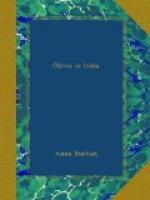Not a hundred yards away a heathen temple stands, with its gilded roof shining in the sun. We tried to go inside it the other day, but an angel with a flaming sword, in the shape of a fakir, kept us out. It didn’t look very attractive. We saw enough when we beheld the post the poor kids and goats are tied to, all messy and horrid from the last sacrifice. The priest who forbade us to enter, just to show there was no ill-feeling, hung wreaths of marigolds round our necks. Boggley, once we were out of sight, hid his in the ditch, but I, afraid they might find out and be offended, went about for the rest of the day decked like any sacrificial goat.
That we are leading the Simple Life I think you would admit if you saw us at our meals. I find that food really matters very little. Our cook is of the jungle jungly. Autolycus is disgusted with him, and does his best to reform him. Chota-hazri I have alone, as Boggley is away inspecting before seven o’clock. I emerge from my tent and find a table before Boggley’s tent with a cloth on it,—not particularly clean,—a loaf of bread (our bread is made in jail: a chuprassi goes to fetch it every second day), a tin of butter, and a tin of jam. Autolycus appears accompanied by the jungly cook, bearing a plate of what under happier circumstances might have been porridge. A spoonful or two is more than enough. “No good?” demands Autolycus. “No,” and disdainfully handing the plate back to the entirely indifferent cook, he proceeds to produce from somewhere about his person a teapot and two tiny eggs. Luncheon is much worse, for the food that appears is so incalculably greasy that it argues a more than bowing acquaintance with native ghee. Dinner is luncheon intensified, so tea is really the only thing we can enjoy. The fact is, if we thought about it we would never eat at all. I happened to walk round the tent to-day, and found the dish-washer washing our dishes in water that was positively thick, and drying them with a cloth that had begun life polishing our brown boots. I stormed at him in English, and later Boggley stormed at him in Hindustani, and he vowed it would never happen again; but I dare say if I were to look round at this minute, I should find him doing exactly the same thing; and I don’t really care so long as neither of us perishes with cholera as a result.
Such funny things live behind my tent! What should I find the other day but a little native baby—about two or three years old. It seems his mother is dead, and his father, who is our chokidar, has to take him with him wherever he goes. He is the oddest little figure, clothed in a most inadequate shirt, and a string round his neck with a shell attached to keep away evil spirits. His hair is closely shaved except for one upstanding tuft which is left to pull him up to heaven with; and his face looks nothing but two great twinkling eyes. He squats beside me nearly all day, and eagerly eats anything




